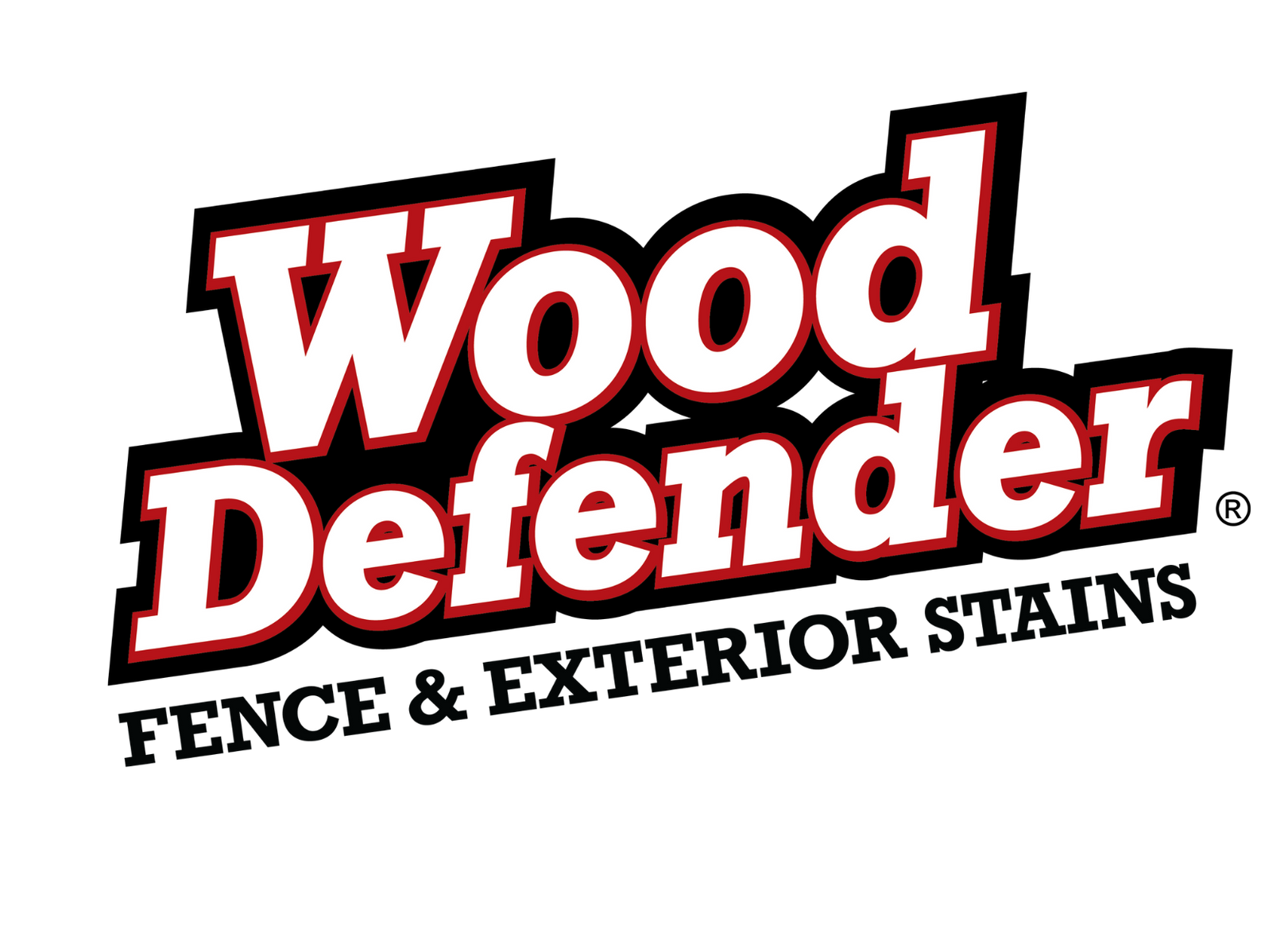Blogs

A wood fence adds warmth, charm, and privacy to any home—but without proper care, even the sturdiest wood can fall victim to weather, insects, and time. Fortunately, with a few simple maintenance steps, you can protect your investment and keep your fence looking its best for years to come. Here’s how. 1. Inspect Regularly Make it a habit to walk your fence line at least twice a year—once in the spring and again before winter. Look for loose boards, leaning posts, cracks, or signs of rot. Catching small issues early prevents them from becoming costly repairs later. 2. Clean Your Fence Dirt, mildew, and algae can build up over time. To clean your fence: Mix mild detergent with warm water, or use a power washer on a low setting. Scrub with a soft brush to remove grime and buildup. Rinse thoroughly and allow the wood to dry completely before applying any treatments. A good cleaning once or twice a year helps preserve the wood and keeps your fence looking fresh. 3. Stain or Seal the Wood Weather and UV rays can cause wood to dry out, fade, and crack. Applying a high-quality wood stain or sealant every 2–3 years offers protection and enhances the fence’s appearance. Choose a UV-resistant stain to prevent fading. Apply with a brush or sprayer for even coverage. Always seal after cleaning and drying the wood fully. 4. Protect Against Rot Rot is a wood fence’s worst enemy. To prevent it: Keep soil and mulch away from the bottom of the fence to avoid moisture buildup. Replace any damaged or rotting boards promptly. Use gravel at the base of posts for better drainage. Moisture management is key—wood that stays dry lasts much longer. 5. Watch for Pests Termites and carpenter ants can quickly damage wood fences. Keep vegetation trimmed away and avoid stacking wood or debris near your fence. If you notice small holes or sawdust trails, inspect immediately and treat with a wood-safe insecticide if needed. 6. Make Quick Repairs Small cracks or loose nails can worsen with time and weather. Tighten fasteners, replace missing nails or screws, and fix wobbly posts promptly. Keeping up with small maintenance tasks ensures your fence stays strong and stable. 7. Refresh the Look A fresh coat of paint or stain can transform an aging fence. Choose colors that complement your home’s exterior and landscape, and reapply every few years to maintain curb appeal and protection. Final Thoughts Your wood fence is more than just a boundary—it’s part of your home’s character. With regular cleaning, sealing, and upkeep, you can extend its lifespan, maintain its beauty, and save money on major repairs down the road. A little care goes a long way in keeping your fence strong, secure, and looking great for decades.
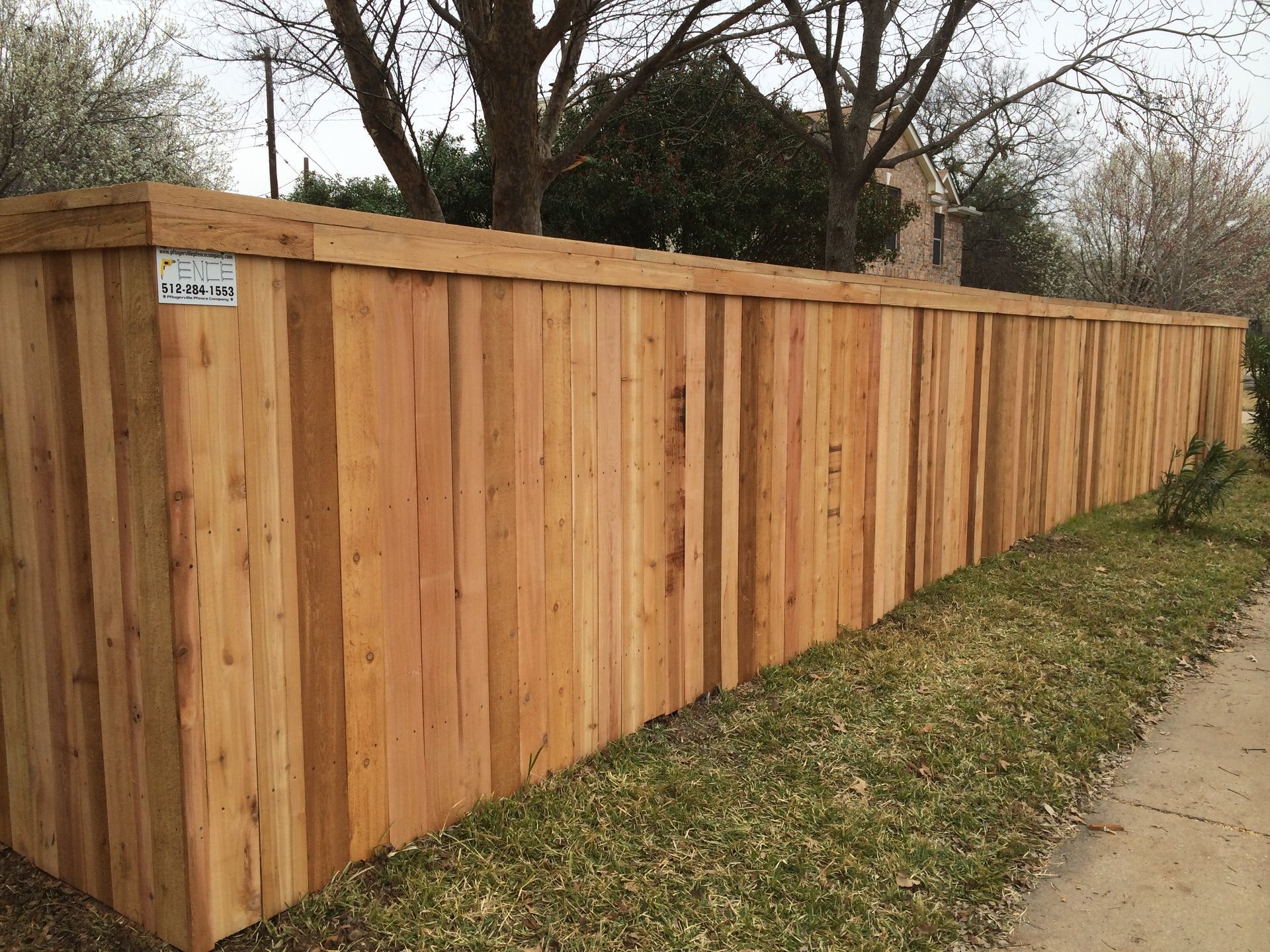
When it comes to choosing a fence for your property, cost is often one of the first factors homeowners consider. While style, durability, and maintenance also play a role, understanding the price difference between fencing materials can help you make a smart long-term investment. Let’s break down how wood fences compare to other common options: vinyl, chain link, and aluminum. Wood Fences: Classic Appeal at a Moderate Cost Wood fences are one of the most popular choices due to their timeless look and versatility. On average, you can expect to pay $15–$30 per linear foot installed, depending on the type of wood (pine, cedar, or redwood) and the design (privacy, picket, or custom). Pros: Natural beauty and customizable designs Mid-range upfront cost Can be stained or painted for a fresh look over time Cons: Requires periodic maintenance (sealing, staining, or painting) Lifespan is shorter compared to metal or vinyl without proper care Vinyl Fences: Higher Upfront, Lower Maintenance Vinyl fencing is often compared to wood because of its similar look, but it comes with a higher price tag—typically $25–$45 per linear foot installed. Pros: Extremely low maintenance (no painting or staining required) Resistant to rot, insects, and moisture Long lifespan (20–30 years or more) Cons: Higher initial cost than wood Limited customization once installed Can crack in extreme temperatures Chain Link Fences: Budget-Friendly but Less Privacy If your main concern is cost, chain link fencing is the most affordable option, usually $10–$20 per linear foot installed. Pros: Lowest cost option Durable and long-lasting Great for defining property lines and keeping pets safe Cons: Offers little to no privacy Industrial look may not complement residential landscapes Limited customization options Aluminum Fences: Elegant but Expensive Aluminum fences provide an upscale, ornamental look, but at $30–$60 per linear foot , they are among the priciest fencing options. Pros: Elegant appearance, often resembling wrought iron Rust-resistant and low maintenance Long lifespan Cons: Higher upfront cost than wood Provides less privacy than solid fences Repairs can be more expensive if sections are damaged Value for Money: Why Many Homeowners Still Choose Wood When comparing cost and aesthetics, wood fences strike a balance between affordability and beauty. While they do require maintenance, their moderate installation cost and design flexibility make them an excellent long-term value for homeowners looking to enhance curb appeal and privacy without breaking the bank. If you’re considering installing a new fence, weigh both the initial investment and the lifetime cost of upkeep . For many families, wood fencing offers the best combination of price, charm, and practicality.
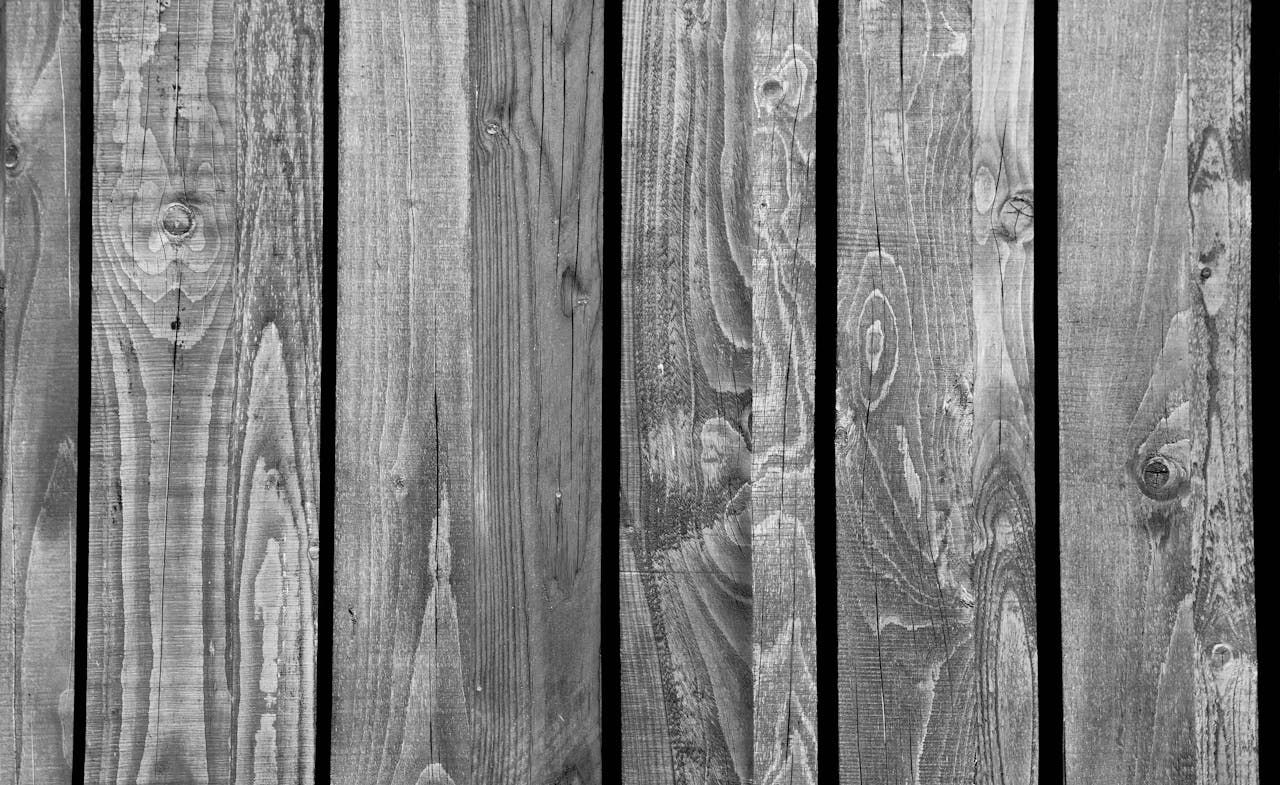
When it comes to choosing the right fence for your property, the options can be overwhelming—vinyl, chain link, metal, composite. Yet, one classic material continues to stand out for homeowners and businesses alike: wood. With its natural charm and practical benefits, wood fencing remains a top choice for anyone seeking a balance between beauty, functionality, and long-term value. Let’s explore the key advantages of wood fences, including aesthetics, privacy, and durability. 1. Aesthetics: Natural Beauty That Complements Any Landscape One of the most compelling reasons to choose wood fencing is its visual appeal. Wood offers a warmth and authenticity that synthetic materials struggle to replicate. Whether you're going for a rustic farmhouse vibe, a classic picket fence look, or a sleek modern design, wood is versatile enough to match almost any architectural style. Wood can also be painted or stained in virtually any color, giving homeowners the freedom to customize their fence to match their home’s exterior or the surrounding landscape. Over time, natural weathering can give wood fences a distinguished, aged look that adds character. 2. Privacy: A Solid Barrier from the Outside World Wood fences excel when it comes to providing privacy. Solid board styles like stockade or board-on-board fencing offer minimal gaps, creating a barrier that shields your yard from neighbors, traffic, or passersby. This makes wood an ideal choice for backyards, gardens, or any space where seclusion is a priority. The height and style of a wood fence can also be adjusted to suit your privacy needs, giving you full control over how much visibility you allow—or block. 3. Durability: Built to Withstand the Elements While some may assume wood is less durable than metal or vinyl, modern treatment methods have significantly improved its resilience. Pressure-treated wood and naturally durable species like cedar or redwood are resistant to rot, pests, and weather damage. With proper installation and regular maintenance—such as sealing, staining, or painting—wood fences can last 15 to 20 years or more. They also tend to be easier and less costly to repair than many other types of fencing, as individual boards can be replaced without needing to overhaul the entire structure. Final Thoughts: A Wise Investment for Form and Function Wood fencing combines form and function in a way that few other materials can. It offers timeless aesthetics, strong privacy protection, and long-lasting durability—all while remaining a relatively affordable and customizable option. Whether you're enhancing curb appeal, creating a backyard oasis, or marking property boundaries, a wood fence can be both a practical and beautiful investment. If you’re considering a new fence, don’t overlook the enduring charm and reliability of wood. It’s a choice that brings value today—and for years to come.
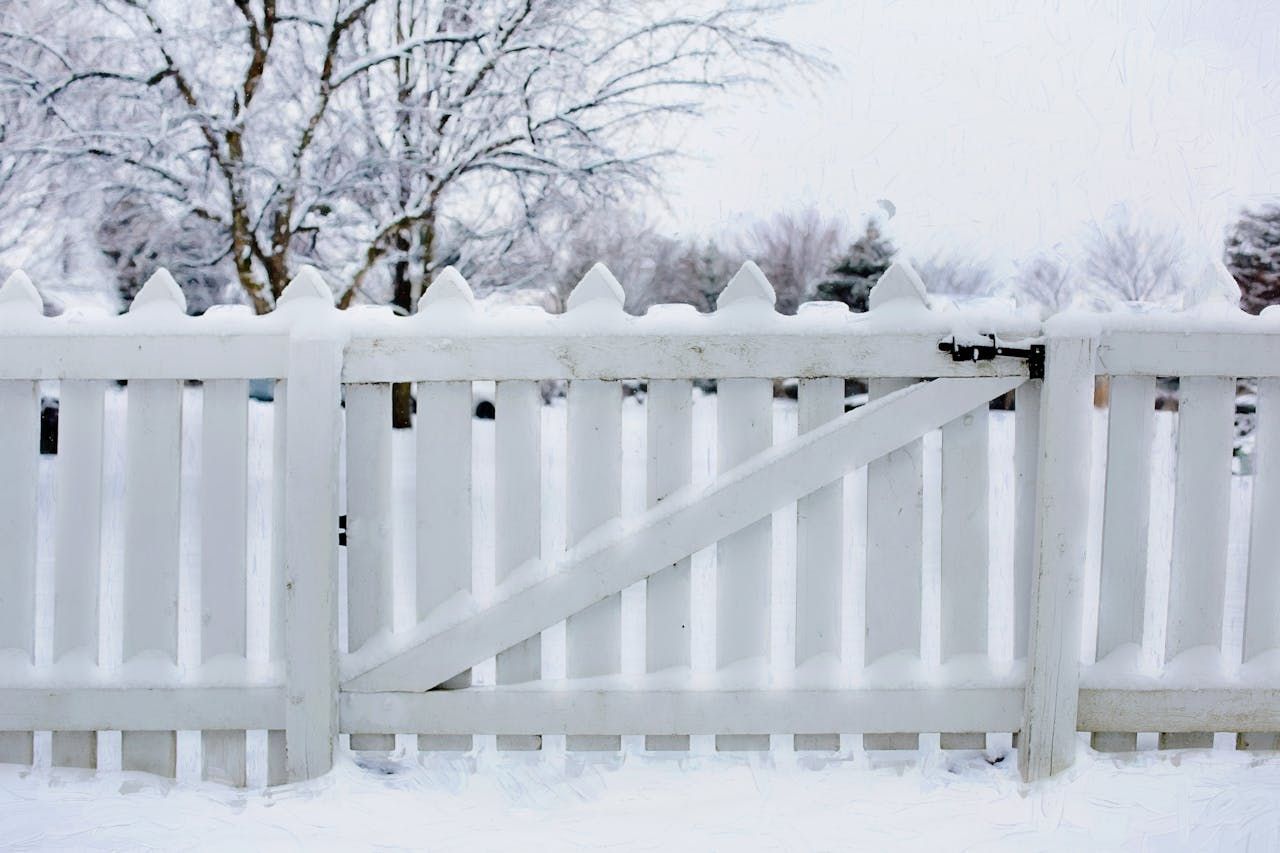
When it comes to building or replacing a wood fence, many homeowners are thinking beyond aesthetics and durability—they're considering the environmental impact as well. Choosing sustainable wood and using eco-friendly treatments not only supports responsible forestry practices but also ensures your fence is safe for people, pets, and the planet. 🌲 Sustainable Wood Options for Fencing Sustainable wood comes from responsibly managed forests where trees are replanted and biodiversity is protected. Here are some top eco-conscious wood choices for fencing: 1. FSC-Certified Wood Look for wood certified by the Forest Stewardship Council (FSC) . This certification ensures the wood is harvested sustainably, with respect to the environment and local communities. 2. Cedar Cedar is a popular choice for fencing thanks to its natural resistance to insects and rot, which reduces the need for chemical treatments. It's durable, widely available, and can be sourced from sustainably managed forests. 3. Redwood Another naturally durable option, redwood has a rich color and excellent resistance to decay. It grows primarily on the West Coast of the U.S., so sourcing it locally (if you're in that region) can reduce your carbon footprint. 4. Bamboo Though technically a grass, bamboo is a rapidly renewable material that can be used for fencing. It grows much faster than trees and can be harvested without killing the plant, making it a super sustainable option. 5. Reclaimed or Recycled Wood Using reclaimed wood not only keeps material out of landfills but also adds unique character to your fence. Salvaged barn wood, pallets, or old decking can be repurposed beautifully. 🌿 Eco-Friendly Treatments for Wood Fences Once you’ve chosen sustainable wood, the next step is protecting it in an environmentally responsible way. Many traditional wood treatments contain toxic chemicals that can leach into soil and waterways. Thankfully, there are greener alternatives: 1. Natural Oil Finishes Oils like linseed, tung, and hemp oil penetrate the wood and provide moisture resistance without synthetic additives. Be sure to choose boiled or polymerized oils for better durability. 2. Water-Based Stains and Sealers These contain fewer volatile organic compounds (VOCs) than oil-based products. Look for low- or zero-VOC options that are labeled as biodegradable and non-toxic. 3. Plant-Based Wood Preservatives Some products use natural plant oils and extracts to protect wood from insects and fungi. These are a great choice for families with pets or children. 4. Borate Treatments Borates are naturally occurring minerals that offer protection from termites and fungi without the harsh chemicals found in conventional wood preservatives. 🌎 Tips for an Eco-Friendly Fence Project Buy local : Reduce emissions by sourcing wood from nearby mills or lumber yards. Plan longevity : Choose durable materials and apply protective treatments to extend the life of your fence. Maintain regularly : Clean and reseal your fence as needed to prevent premature wear. Recycle old fencing : If replacing a fence, look for ways to reuse or recycle the wood instead of sending it to the dump. In Conclusion Choosing a sustainable wood fence doesn’t mean compromising on quality or style—it means making choices that support a healthier planet. By opting for eco-friendly materials and treatments, you’re investing in a fence that’s not just built to last, but built to care.

A wooden fence adds charm, privacy, and security to any property, but choosing the right type of wood is crucial for longevity and aesthetics. Some woods naturally resist decay and pests, while others may require extra treatment and maintenance. In this post, we’ll explore the most popular types of wood for fencing— cedar, pine, and redwood —and their unique properties. 1. Cedar: The Durable and Naturally Resistant Choice Cedar is one of the most popular woods for fencing, and for good reason. It has natural oils and tannins that make it resistant to insects, decay, and rot. Unlike some other types of wood, cedar doesn't require chemical treatments to maintain its durability. Pros of Cedar Fencing: ✅ Naturally resistant to pests and decay ✅ Doesn’t warp or shrink easily ✅ Beautiful reddish-brown color with a pleasant aroma ✅ Can last 15–30 years with proper maintenance Cons of Cedar Fencing: ❌ Higher upfront cost than pine ❌ Requires occasional sealing or staining to maintain color ❌ Can gray over time if left untreated Best Use Cases for Cedar: Cedar is ideal for homeowners looking for a long-lasting, low-maintenance fence with a natural look. It's especially great in humid or rainy climates where resistance to moisture and pests is important. 2. Pine: The Budget-Friendly and Versatile Option Pine is another common choice for fencing, often because it is affordable and widely available . Unlike cedar, pine needs to be pressure-treated to protect it from moisture, rot, and insects. Treated pine fences can last a long time and are a great option for those on a budget. Pros of Pine Fencing: ✅ More affordable than cedar and redwood ✅ Pressure-treated versions resist rot and pests ✅ Can be painted or stained easily ✅ Can last 15–20 years with proper care Cons of Pine Fencing: ❌ Softer wood that can be prone to warping or shrinking ❌ Requires pressure treatment to improve durability ❌ Needs regular maintenance and sealing Best Use Cases for Pine: Pine is perfect for homeowners who want a cost-effective fence that can be stained or painted to match their home. It’s also a great option for large properties where affordability is a priority. 3. Redwood: The Premium and Long-Lasting Choice If you're looking for beauty and durability , redwood is one of the best fencing materials available. Similar to cedar, it has natural oils that resist pests and decay , but it also boasts a rich, deep red color that many homeowners love. Pros of Redwood Fencing: ✅ Naturally resistant to insects and rot ✅ Stunning appearance with deep red hues ✅ Extremely durable, lasting 20–40 years ✅ Less prone to warping compared to pine Cons of Redwood Fencing: ❌ Expensive, often more than cedar or pine ❌ Requires sealing to maintain color and prevent graying ❌ Availability may vary depending on location Best Use Cases for Redwood: Redwood is best for homeowners who want a premium, long-lasting fence that enhances the beauty of their property. It's especially well-suited for high-end landscaping and coastal areas where durability is a must. Final Thoughts: When selecting the right wood for your fence, consider your budget, climate, and maintenance preferences : Choose cedar if you want a naturally durable, mid-range option with minimal upkeep. Opt for pine if you need an affordable solution that can be customized with paint or stain. Invest in redwood if you’re looking for the most premium and long-lasting wood. No matter which wood you choose, regular maintenance—such as sealing, staining, and occasional repairs —will extend the life of your fence and keep it looking beautiful for years to come.
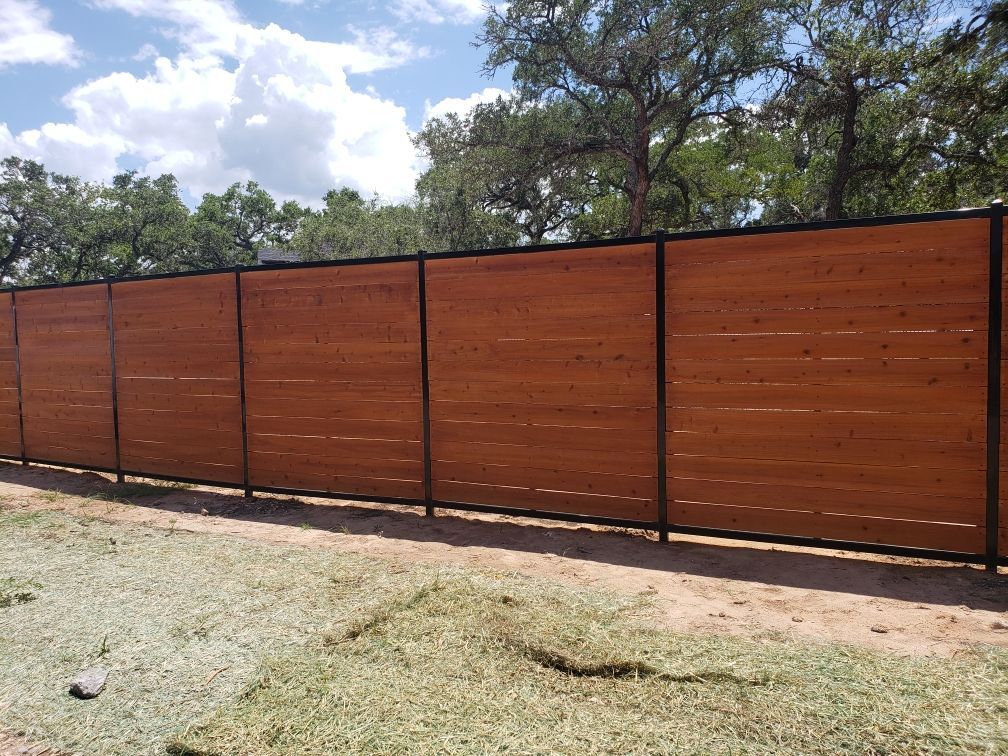
A wooden fence adds charm, privacy, and security to any property, but choosing the right type of wood is crucial for longevity and aesthetics. Some woods naturally resist decay and pests, while others may require extra treatment and maintenance. In this post, we’ll explore the most popular types of wood for fencing— cedar, pine, and redwood —and their unique properties. 1. Cedar: The Durable and Naturally Resistant Choice Cedar is one of the most popular woods for fencing, and for good reason. It has natural oils and tannins that make it resistant to insects, decay, and rot. Unlike some other types of wood, cedar doesn't require chemical treatments to maintain its durability. Pros of Cedar Fencing: ✅ Naturally resistant to pests and decay ✅ Doesn’t warp or shrink easily ✅ Beautiful reddish-brown color with a pleasant aroma ✅ Can last 15–30 years with proper maintenance Cons of Cedar Fencing: ❌ Higher upfront cost than pine ❌ Requires occasional sealing or staining to maintain color ❌ Can gray over time if left untreated Best Use Cases for Cedar: Cedar is ideal for homeowners looking for a long-lasting, low-maintenance fence with a natural look. It's especially great in humid or rainy climates where resistance to moisture and pests is important. 2. Pine: The Budget-Friendly and Versatile Option Pine is another common choice for fencing, often because it is affordable and widely available . Unlike cedar, pine needs to be pressure-treated to protect it from moisture, rot, and insects. Treated pine fences can last a long time and are a great option for those on a budget. Pros of Pine Fencing: ✅ More affordable than cedar and redwood ✅ Pressure-treated versions resist rot and pests ✅ Can be painted or stained easily ✅ Can last 15–20 years with proper care Cons of Pine Fencing: ❌ Softer wood that can be prone to warping or shrinking ❌ Requires pressure treatment to improve durability ❌ Needs regular maintenance and sealing Best Use Cases for Pine: Pine is perfect for homeowners who want a cost-effective fence that can be stained or painted to match their home. It’s also a great option for large properties where affordability is a priority. 3. Redwood: The Premium and Long-Lasting Choice If you're looking for beauty and durability , redwood is one of the best fencing materials available. Similar to cedar, it has natural oils that resist pests and decay , but it also boasts a rich, deep red color that many homeowners love. Pros of Redwood Fencing: ✅ Naturally resistant to insects and rot ✅ Stunning appearance with deep red hues ✅ Extremely durable, lasting 20–40 years ✅ Less prone to warping compared to pine Cons of Redwood Fencing: ❌ Expensive, often more than cedar or pine ❌ Requires sealing to maintain color and prevent graying ❌ Availability may vary depending on location Best Use Cases for Redwood: Redwood is best for homeowners who want a premium, long-lasting fence that enhances the beauty of their property. It's especially well-suited for high-end landscaping and coastal areas where durability is a must. Final Thoughts: When selecting the right wood for your fence, consider your budget, climate, and maintenance preferences : Choose cedar if you want a naturally durable, mid-range option with minimal upkeep. Opt for pine if you need an affordable solution that can be customized with paint or stain. Invest in redwood if you’re looking for the most premium and long-lasting wood. No matter which wood you choose, regular maintenance—such as sealing, staining, and occasional repairs —will extend the life of your fence and keep it looking beautiful for years to come.
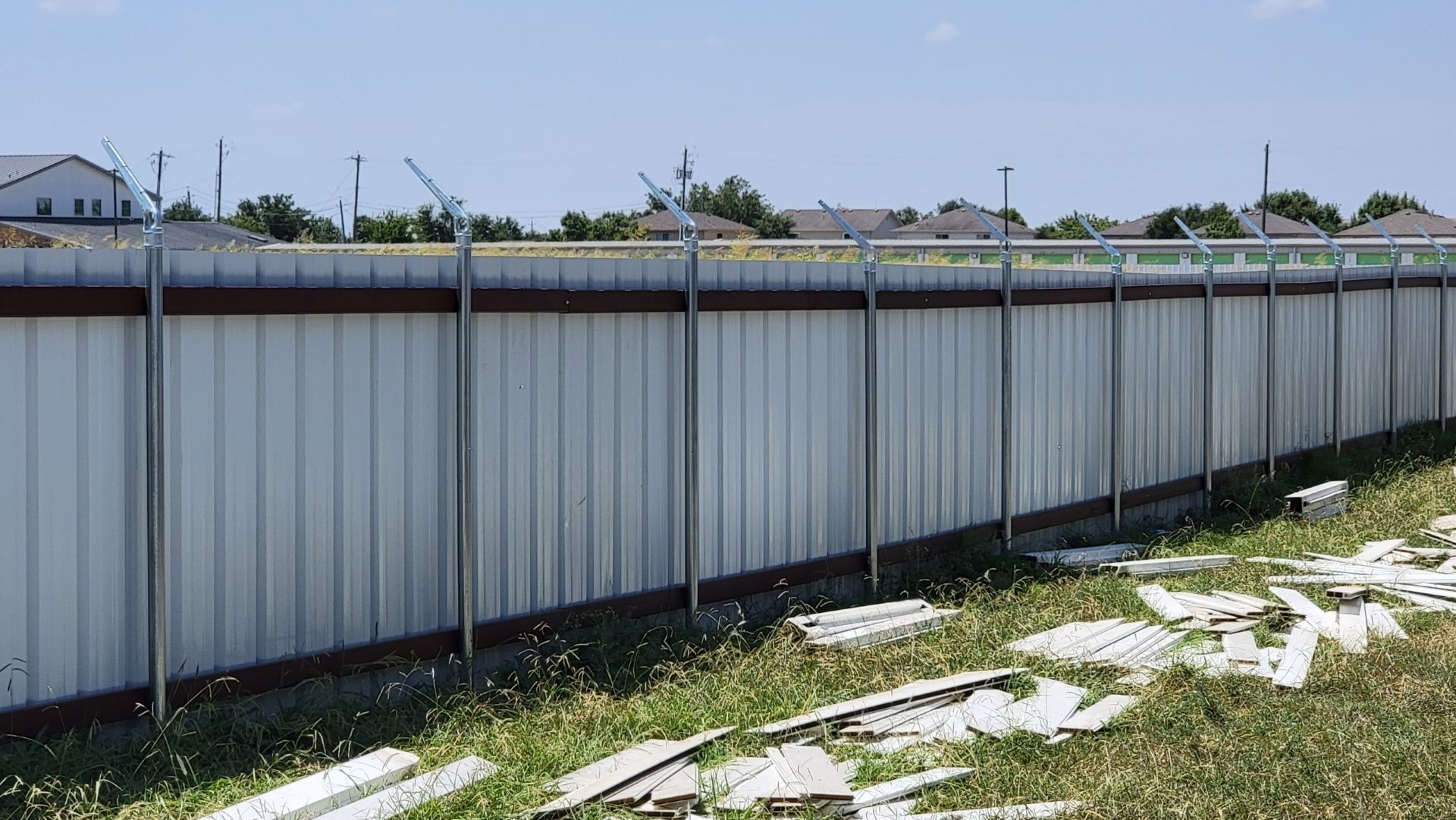
As the seasons change, so do the challenges your fence faces. Strong winds, storms, and unpredictable weather can put even the sturdiest fences to the test. At Pflugerville Pfence, we know how important it is to have a fence that stands up to the elements while keeping your property safe and secure. So, as the winds start to pick up, let’s talk about fence preparedness and how you can ensure your barrier is ready to withstand whatever Mother Nature throws its way. Signs Your Fence May Need Reinforcement Before the strong winds arrive, take a moment to inspect your fence for these common weaknesses: ✔ Loose or Rotting Posts – Wooden fences can deteriorate over time, and weak posts are the first to fall when strong winds hit. Check for signs of rot or instability. ✔ Rust and Corrosion – If you have a metal or chain-link fence, rust can weaken its structure. Look for signs of wear and treat them before the next storm. ✔ Cracked or Warped Panels – Vinyl and wooden fences can warp or crack due to temperature changes. These weak points make your fence more vulnerable to wind damage. ✔ Unstable Footings – If your fence posts aren’t set deep enough or have shifted over time, they won’t provide the necessary support against high winds. How to Strengthen Your Fence Against Wind If you notice any of these issues, don’t wait until it’s too late! Here are some proactive steps you can take: 🔨 Reinforce the Posts – Ensure all posts are deeply set (at least 2 feet in the ground) and secured with concrete. If they feel loose, consider reinforcing them with additional support. 🌲 Trim Nearby Trees and Bushes – Overgrown branches can add pressure to your fence or even cause damage if they break during a storm. Keep surrounding vegetation well-maintained. 🔗 Choose Wind-Resistant Materials – Solid panel fences may act as a sail in strong winds. If you live in a windy area, consider designs like shadowbox fencing , which allows air to pass through while maintaining privacy. 🛠 Repair Before the Storm – Small cracks or minor leaning issues can turn into major damage when the wind picks up. Address repairs before bad weather strikes. Upgrade to a Stronger, More Durable Fence If your current fence has seen better days, it might be time for an upgrade. At [Your Company Name], we offer high-quality fencing solutions designed to withstand harsh weather conditions. Whether you need a durable vinyl , sturdy aluminum , or reinforced wooden fence , we’ve got you covered. Get Your Fence Storm-Ready Today! Don’t wait until the winds are howling to think about your fence’s strength. Contact Pflugerville Pfence today for a free inspection and consultation. Our team of experts will help you fortify your fence or install a new one that’s built to last. Stay safe, stay secure, and stay ahead of the storm! 🌬🏡
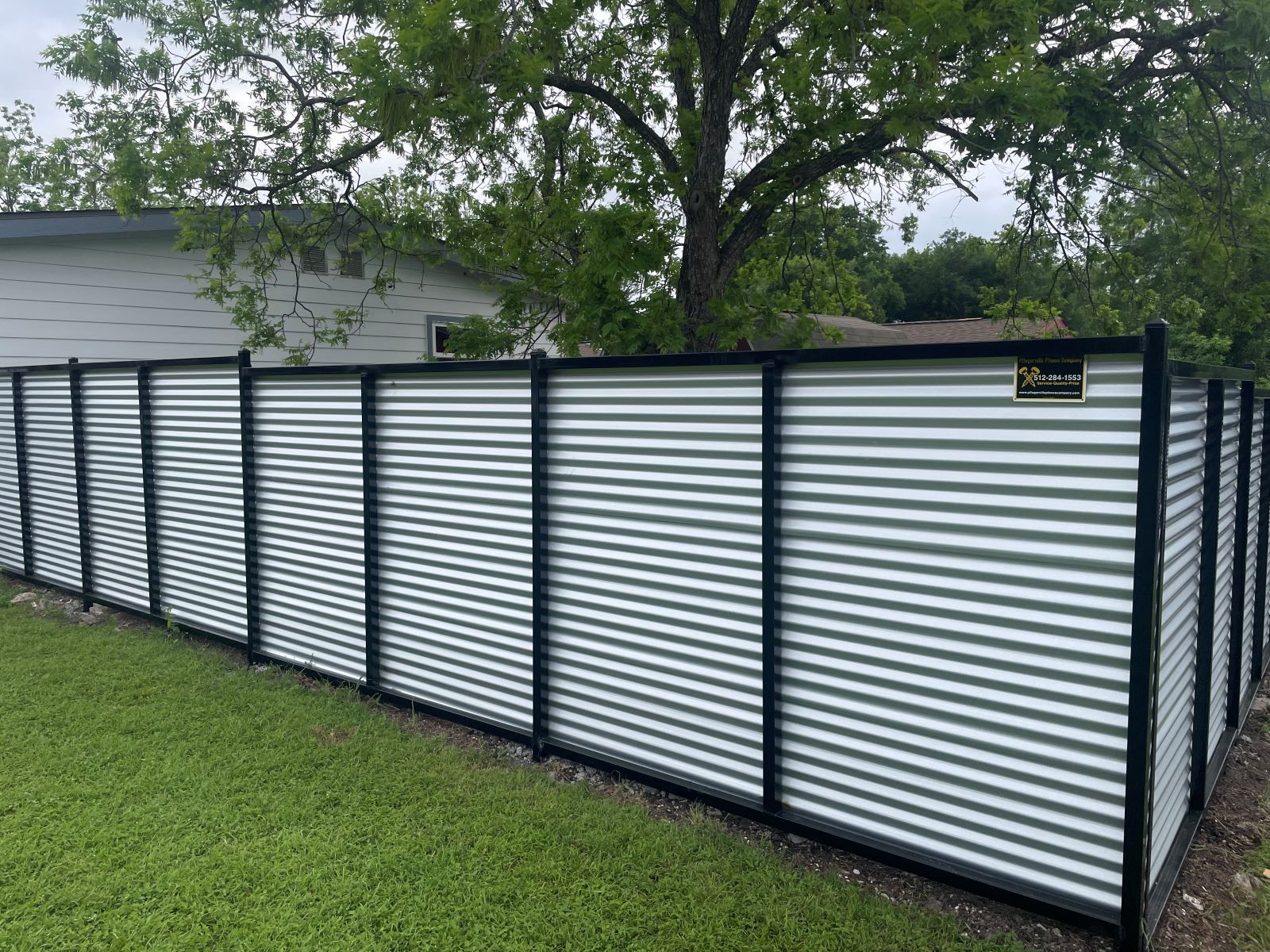
When it comes to fences, it can be difficult at times when you dive into it We’ve helped tens of thousands over the years with their first fence repair/replacement from all ages. We understand you may buy several cars, homes or commodities and you know the protocol and what to expect each time. There’s many opinions & suggestions from fence companies and how to go about the bidding process, approaching neighbors, overall fence construction, material options, payment process and more. We visit your property to see the scope of work, answer any questions, review for any obstacles and offer any recommendations if requested We can guide you through shared fence lines discussions and share Best Practices that’s worked for many other homeowners. We have all types of fences we have experience with as well as HOA community experience when there’s not much deviation from their guidelines and requirements. We also are familiar with city code on fence styles and heights. We can offer a wide range of fence material depending on your budget and situation. If it’s wood, we will build with screws always We accept all forms of payment (Cash, Check, Debit/Credit Card) and we offer 18 months no interest financing. Our secure pay portal is on our website. We also break down the quote based on each segment of the property so it’s easy to show the neighbors the fence line, footage and cost. We can also break down the quote and send directly to the neighbor for them to pay us directly. Our bids are complimented often. They are very professional and easy to understand. From the site details to our in-depth company and fence information to the property breakdown and item description to the color coded site drawing along with the actual contract. This makes it easy to review your bid, sign electronically Scheduling is done based on your needs and property availability. We work Monday through Saturday and we also contact 811 for the utilities to be marked prior to the fence work as required by the state. Our crew will complete a final walk through upon completion to ensure your project is completed properly and with your approval.

When it comes to building projects, whether residential, commercial, or industrial, the choice of materials can make all the difference in the durability, longevity, and overall success of the structure. Concrete, the foundation of much of modern construction, is no exception. Traditionally, standard concrete has been the go-to option for most projects, but over time, innovations in construction materials have led to the rise of alternatives that promise enhanced performance. One such innovation is Maximizer Concrete, a superior option compared to standard concrete. In this post, we’ll explore the benefits of Maximizer Concrete and why it’s quickly becoming the material of choice for many construction professionals and project managers. What is Maximizer Concrete? Maximizer Concrete is an advanced blend of high-performance materials designed to exceed the capabilities of traditional concrete. This innovative mix uses a combination of special additives, fibers, and aggregates that result in a concrete mix offering improved strength, durability, and resistance to wear and tear. It’s engineered to address common issues that arise with standard concrete, such as cracking, shrinkage, and lower longevity under harsh environmental conditions. Key Benefits of Maximizer Concrete Over Standard Concrete 1. Enhanced Durability Maximizer Concrete boasts superior durability compared to traditional concrete. Its unique composition offers increased resistance to cracking, water infiltration, and freeze-thaw cycles. Standard concrete, while durable, is more susceptible to environmental damage over time, particularly in areas that experience extreme weather conditions. Maximizer Concrete’s resilience means fewer repairs and maintenance costs in the long run, making it an ideal choice for structures exposed to harsh climates or heavy wear. 2. Higher Strength One of the most significant advantages of Maximizer Concrete is its enhanced compressive strength. Standard concrete typically has a strength of around 3,000 to 5,000 psi (pounds per square inch), while Maximizer Concrete can exceed 7,000 psi, depending on the mix. This increased strength allows for the construction of more robust structures, reducing the need for additional reinforcement and enabling the use of less material without sacrificing stability. 3. Better Crack Resistance Cracking is a common problem in concrete, often caused by shrinkage, thermal expansion, or external forces. Maximizer Concrete is formulated with materials that reduce shrinkage and improve flexibility, significantly lowering the likelihood of cracks forming over time. By preventing cracks, Maximizer Concrete helps maintain the structural integrity of buildings and infrastructure, which is vital for both safety and longevity. 4. Improved Workability Despite its higher strength and durability, Maximizer Concrete is easier to work with than standard concrete. It has improved flowability and can be placed more efficiently, reducing the labor time and complexity of the project. This enhanced workability leads to a smoother surface finish and fewer issues during the pouring and setting process. 5. Sustainability Maximizer Concrete is often a more sustainable option compared to standard concrete. Some formulations of Maximizer Concrete incorporate recycled materials, reducing the overall carbon footprint of the construction project. The added longevity and reduced need for repairs also contribute to a more environmentally friendly construction process, as structures built with Maximizer Concrete require less frequent replacements and repairs, saving resources over time. 6. Lower Maintenance Costs Because of its superior resistance to environmental factors and reduced susceptibility to cracking and wear, Maximizer Concrete requires less maintenance than standard concrete. This translates into significant cost savings over the lifetime of the structure. With fewer repairs needed, owners of buildings constructed with Maximizer Concrete can expect lower long-term maintenance costs, making it a wise investment. 7. Versatility Maximizer Concrete’s exceptional performance characteristics make it suitable for a wide range of applications. Whether it’s being used for foundations, parking lots, pavements, bridges, or even industrial floors, Maximizer Concrete excels in various environments. Its versatility and superior properties allow it to perform in demanding situations where standard concrete may fall short. Real-World Applications Maximizer Concrete is used in many high-performance projects where strength, durability, and longevity are paramount. Some of its common applications include: - Infrastructure projects : Highways, bridges, and tunnels often benefit from Maximizer Concrete’s superior strength and crack resistance. - Commercial and residential buildings : Buildings subjected to high traffic or harsh environmental conditions, such as coastal areas or places with freeze-thaw cycles, can benefit from the durability of Maximizer Concrete. - Industrial applications : Factories and warehouses with heavy equipment or machinery benefit from Maximizer Concrete’s high strength and wear resistance. Conclusion While standard concrete remains a reliable and widely used material in construction, Maximizer Concrete offers distinct advantages that make it a better choice for many modern projects. Its superior strength, durability, crack resistance, and reduced maintenance costs position Maximizer Concrete as a long-term solution for those looking to enhance the performance and lifespan of their structures. Whether you’re working on a residential project, an infrastructure endeavor, or an industrial application, choosing Maximizer Concrete can help you build stronger, more durable, and more cost-effective structures. As the demand for high-performance materials grows, Maximizer Concrete is quickly establishing itself as the future of construction.

The economic situation in North America is currently marked by one of the most intense trade conflicts in recent history. President Trump's decision to impose new tariffs—10% on all imports from China and 25% on goods from Mexico and Canada—has reverberated across global markets, and several industries are poised to feel the strain. One of the most significant sectors affected is Canadian lumber, which plays a crucial role in the US timber market. New Tariffs Impacting Key Trading Partners President Donald Trump declared an economic emergency to enforce new tariffs, specifically targeting Canadian imports with a 25% duty. Canada is a major trade partner for the US, and the tariffs focus on a range of goods, including energy products (oil, natural gas, and electricity) and timber. On August 13, 2024, the U.S. Department of Commerce issued its final findings in the Fifth Annual Administrative Review of Canadian lumber exports. This review resulted in a new combined duty rate of 14.54%, nearly double the previous rate of 8.05%. The new rate applies to both past shipments from 2022 and future exports. For the Canadian softwood lumber sector, already the largest foreign supplier of softwood lumber to the U.S., this poses a significant challenge. Industry experts believe that the 25% tariff imposed under the economic emergency could be added on top of the newly adjusted duty rate, bringing the total effective tariff to 39.5%. This situation is expected to affect lumber producers and professionals in the forest products industry on both sides of the border. Though there was a one-month delay announced for these tariffs on February 4, understanding their potential effects remains crucial. What Effects Will These Tariffs Have on the US Lumber Market? Both Canada (on the supply side) and the U.S. (on the demand side) are set to face significant challenges. However, the U.S. market may emerge in a stronger position in the long term. ResourceWise estimates that approximately 1.3 billion board feet of lumber capacity in British Columbia is now at risk due to these tariffs. The added expenses make it more difficult for Canadian producers to export lumber to the U.S. profitably. Canada is a leading supplier of Spruce-Pine-Fir (SPF) lumber. When U.S. demand exceeded Canadian supply in the past, the Pacific Northwest (PNW) stepped in to fill the gap, followed by imports from Europe. Currently, European imports meet about 6% of U.S. demand. With tariffs on Canadian lumber increasing, PNW producers and European exporters are expected to benefit from this shift. As PNW production rises to compensate for reduced Canadian imports, log availability in the region will decrease, leading to higher log prices and increased pressure on sawmill profits. Southern Yellow Pine (SYP), though not a direct substitute for SPF in framing applications, might see an uptick in demand, benefiting the South. However, log prices are not expected to rise significantly due to an ample supply of pine sawtimber. Potential Adaptations for the US Lumber Market To make up for the reduction in Canadian supply, several potential scenarios could unfold: Increased Production in the Pacific Northwest (PNW): Operating rates in the PNW are currently low, but are expected to rise from the low 70% range to approximately 80%. This increase could boost lumber production by 5% to 10%, adding up to 1.3 billion board feet annually. However, this may come with higher log prices as demand for logs increases. Scaling Up Southern Production: Southern sawmills might also increase their production to fill the gap. If PNW production only rises by 5%, the shortfall will require a 3% boost in Southern production. With no shortage of sawlogs, sawtimber prices in the South are expected to remain stable. Boosting European Imports: If PNW production is on the lower end of the projected range, Europe could increase its exports to the U.S. by 22% to help fill the supply gap. However, to make these volumes profitable, lumber prices will need to increase sustainably. What Should Forest Products Professionals Expect? The full effects of the tariffs on the lumber market won’t be felt immediately, but their long-term impact could reshape industry dynamics. A decline in Canadian lumber imports might lead to mill closures and a permanent reduction in capacity. This shift could open opportunities for U.S. producers or European importers to fill the gap. Global buyers will need to diversify their sourcing strategies more than ever. However, geopolitical and economic uncertainties mean that diversification carries its own risks. Staying Prepared in an Evolving Economic Landscape The U.S. lumber market is preparing for a challenging period, and it’s crucial for businesses to adapt. The ongoing U.S.-Canada trade tensions underscore the fragile nature of global trade, and for lumber producers, these tariffs present both a challenge and an opportunity. Staying informed and leveraging data-driven strategies is key to maintaining competitiveness during this period of change. ResourceWise offers tools to help forest products professionals navigate these shifts, providing: Market Data: Access to real-time information on lumber supply, pricing, and demand trends. Expert Insights: Analysis of how tariffs and geopolitical tensions affect the marketplace. Forecasting Tools: Advanced tools to predict market shifts and plan accordingly.






